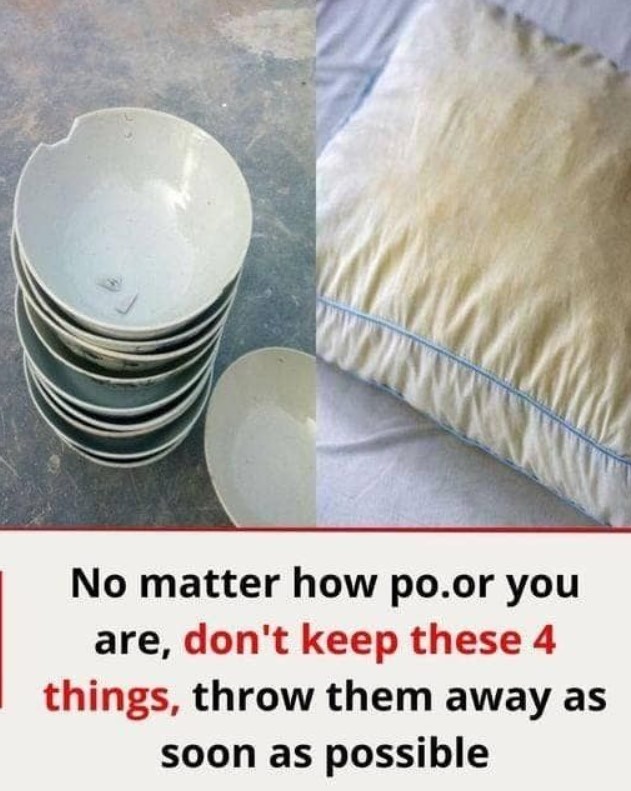Decluttering Your Home for a Fresh Start
Decluttering is more than just tidying up—it’s a transformative process that can bring clarity, calmness, and a sense of control to your life. While some items are easy to part with, others hold sentimental value or seem useful enough to keep, creating a mental tug-of-war. If you’ve ever wondered what stays and what goes, this guide will help you navigate those decisions.
From items that pose risks to outdated clutter weighing you down, here are 14 things you should always toss and 10 that might deserve a second chance.
14 Things You Should Always Throw Away
- Expired Medications Prescription and over-the-counter medications lose their efficacy over time and may even become harmful. Consuming expired drugs can lead to unwanted side effects and pose a serious risk to children and pets. Instead of tossing them in the trash, look for local pharmacy programs or medication take-back events to dispose of them responsibly.
- Worn-Out Shoes Shoes that are past their prime do more harm than good. Besides causing discomfort, they can lead to blisters or exacerbate foot issues. If repair isn’t an option, recycle them or donate gently used pairs to organizations that repurpose footwear.
- Broken Electronics Outdated or damaged gadgets like old phones, chargers, and headphones often collect dust. Instead of storing these items, take them to an e-waste recycling facility to prevent environmental harm and free up valuable space.
- Damaged or Mismatched Clothing A drawer full of mismatched socks and torn clothing serves no purpose. If the items can’t be repaired or repurposed, it’s time to let them go. Many organizations accept textile donations for recycling, turning your clutter into something useful.
- Expired Cosmetics and Skincare Products Makeup and skincare products have a shelf life. Beyond expiration, they can irritate your skin or harbor bacteria. If the texture, smell, or color has changed, it’s a clear sign to toss them.
- Antiquated Instruction Manuals With the internet offering instant access to user guides, keeping physical manuals for obsolete or unused items is unnecessary. Recycle these papers to declutter your shelves.
- Old Receipts Unless required for taxes or warranties, most receipts don’t need to stick around. Scan important ones for digital storage and discard the rest, especially as the ink fades over time.
- Stale Pantry Items Expired spices, sauces, and pantry staples take up valuable space and can diminish the quality of your cooking. Check expiration dates and restock with fresh ingredients.
- Damaged Furniture Holding onto broken or unusable furniture only adds clutter. If repair isn’t an option, consider donating or recycling through appropriate channels.
- Old Magazines and Newspapers Piles of outdated reading material quickly become dust collectors. Keep only sentimental issues or useful clippings; recycle the rest.
- Duplicate Kitchen Utensils An overabundance of utensils can make your kitchen chaotic. Donate extras to someone who needs them or a local shelter.
- Unused Hobby Supplies From paints to knitting yarn, supplies for abandoned hobbies occupy valuable space. Donate to schools, art programs, or community centers.
- Unmatched Tupperware Containers without lids or warped plastic storage items create unnecessary clutter. Recycle or repurpose what you can and dispose of the rest.
- Outdated Holiday Decorations Broken ornaments and frayed garlands should be replaced with ones that add cheer, not stress. Donate gently used decorations to second-hand stores.
10 Things You Shouldn’t Throw Away
While decluttering is important, some items deserve a second look. Here’s what you might want to keep:
- Family Heirlooms Items passed down through generations carry sentimental value and cultural significance. Keep these treasures safe and well-maintained.
- Important Documents Tax returns, legal papers, and property deeds should be organized and securely stored. Digital backups can be a helpful addition but don’t replace originals.
- Quality Tools High-quality tools are worth keeping, even if used infrequently. They’re an investment that saves money on repairs or DIY projects.
- Emergency Supplies Flashlights, first-aid kits, and non-perishable food are essential for unexpected situations. Regularly check and replenish your stock.
- Reusable Bags These eco-friendly alternatives to plastic bags help reduce waste and are handy for groceries and travel.
- Classic Clothing Pieces Timeless wardrobe staples like blazers and tailored dresses rarely go out of style. Keep these pieces for versatile dressing.
- Sentimental Photos Physical photographs preserve memories in a way digital copies can’t replicate. Organize them in albums for safekeeping.
- High-Quality Furniture Well-made furniture pieces can last decades with proper care. Reupholster or refinish if needed.
- Books While not all books need to stay, cherished favorites or ones with educational value are worth holding onto.
- Spare Parts Extras for appliances, electronics, or vehicles can save you the hassle of future replacements. Organize these in labeled containers for easy access.
The Benefits of Mindful Decluttering
Decluttering isn’t just about creating a cleaner space—it’s about fostering a lifestyle of intentionality and simplicity. By evaluating what you truly need and what you can let go of, you’ll discover a newfound sense of freedom and mental clarity. Whether it’s tossing out broken gadgets or keeping cherished memories, the key is balance. So take a deep breath, roll up your sleeves, and start curating a space that reflects your best self. Remember, every small step counts toward creating a home filled with purpose and joy.










